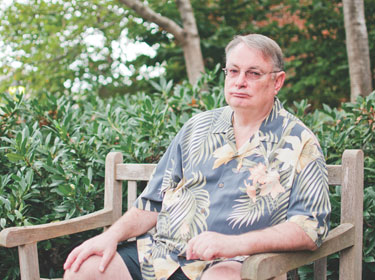With Veterans Day coming up Nov. 11, the nation takes some time this month to honor the veterans of the U.S. armed forces. One of them is Marvin Carter, though he's still waiting for the honor – or at least the benefits.
Nearly three decades ago, Carter, 60, was discharged from the Marine Corps for being gay. It was the sort of discharge that cut Carter off from the investment he'd made in the military between 1972 and 1985. In short, the Pentagon discharged Carter with not so much as a thank you, but with post-traumatic stress disorder (PTSD) and no access to Veterans Health Administration medical services to treat it.

Marvin Carter
Rather than stress from being a closeted Marine – or the stress of surviving three military plane crashes – Carter and the professionals treating him suspect his PTSD is rooted in a particularly nerve-racking military tactic.
''We flew covert ops and we would get shot at on a regular basis, especially by the North Koreans and Yemenis. They were always the worst,'' recalls Carter, who speaks not with any gung-ho bluster, but with calm reserve. ''Our evasive technique was called a 'dead drop.' We were flying at 35,000 feet. When they would start to shoot – I was the mission commander – I would get in position. The pilot would get his fingers on the engine. We would turn all the engines off. When we go to a thousand feet, the pilot would turn on the engines. It was a very common evasive technique, but the g-forces on you were incredible. [My doctor] really thinks that doing that on a weekly basis for two years probably took a tremendous toll on my brain.''
What happened in 1984 took a tremendous toll on Maj. Carter's career. Working in Guantanamo Bay, he was confronted by an investigator after his name was spotted on a gay-related mailing list. Carter, a father of two and already separated from his wife, confirmed the investigator's accusation. By 1985, Carter's discharge was complete.
With the help of friends, he began putting his career back together, first accepting a position as president of a business college. Eventually, he opened up a companion service in Washington, which is where he found that there were plenty of others who were in need of help, suffering trauma of their own.
''I saw a lot of people in need, a lot of people struggling,'' Carter says of that since-closed companion service. ''It was any range of things. Drugs, alcohol…. Having had many friends who are transgender, having counseled them, listened to their struggles in life, a lot of them for years turned to the work I was in – not because they wanted to, but because they'd get fired. 'I don't know what else to do,' kind of thing. I just don't like discrimination in any form.''
Carter's fondness for the Marine Corps – despite his being forced out – and desire to help those in need came together at a unique intersection. Since 1986, Carter has held an annual dinner honoring the Nov. 10, 1775, founding of the corps. He informally used the dinner as a fundraiser for various organizations, but formalized the effort in 2008.
''I'd been doing my 10 November dinners ever since I got out of the military,'' he explains. ''We used to give any proceeds to places like [Servicemembers Legal Defense Network]. Some friends counseled me, 'You really need to form a 501c3 and make the philanthropic work a little bit more focused.' They sat down with me and filed the applications. The IRS said go and I started putting more and more time into it.''
The effort also took on a new name: Helping Our Brothers and Sisters, aka HOBS. And that helping comes in a variety of forms, such as assistance provided to the late gay-rights icon Frank Kameny – an early HOBS supporter – in his last years.
''Northern Virginia Family Service came to us with lesbians from Cameroon,'' Carter offers as another example. ''They were granted asylum, but they couldn't get dentures. Simple dentures. So we bought dentures. … We got a request from one organization, a young man had been kicked out of his home. He was just 18. His parents kicked him out for being gay and we helped him. We paid his deposit and first month's rent.
''If it's compelling enough, I find the money. We can't help them all, but I think in 2012 we gave away about $85,000 in direct support, probably to about 25 to 30 recipients.''
Those recipients aren't the only ones getting help from HOBS. Carter says that while he continues to appeal the federal government's denial of any VA benefits, his work with HOBS helps to fill the government's gap.
''All the therapists I've worked with say that's probably why I'm still alive,'' he says of his HOBS work. ''It gives me something that I really believe in, that I'm passionate about. I have a reason to live. I like being able to help when people run out of options. It helps a lot, it really does.''
The 5th Annual HOBS Dinner, honoring HOBS Community Service Award recipient Charles Francis, is Saturday, Nov. 10, at Rajaji Curry House, 2603 Connecticut Ave. NW. Reception from 6 p.m. to 7, followed immediately by dinner at 7 p.m. Tickets, $150, are available at helpingourbrothersandsisters.org.
...more